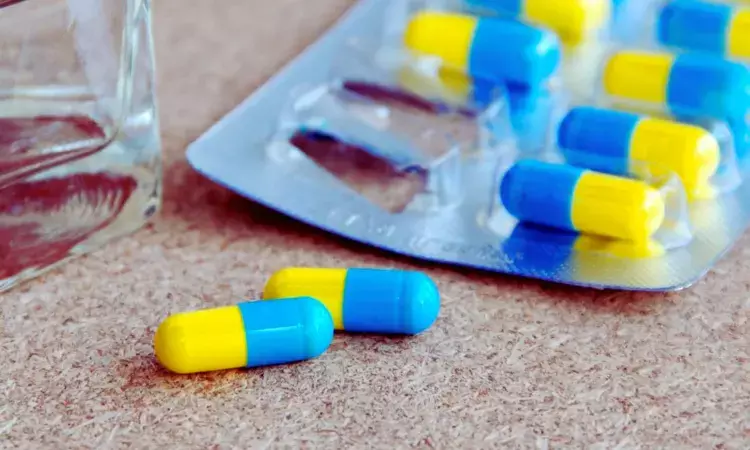- Home
- Medical news & Guidelines
- Anesthesiology
- Cardiology and CTVS
- Critical Care
- Dentistry
- Dermatology
- Diabetes and Endocrinology
- ENT
- Gastroenterology
- Medicine
- Nephrology
- Neurology
- Obstretics-Gynaecology
- Oncology
- Ophthalmology
- Orthopaedics
- Pediatrics-Neonatology
- Psychiatry
- Pulmonology
- Radiology
- Surgery
- Urology
- Laboratory Medicine
- Diet
- Nursing
- Paramedical
- Physiotherapy
- Health news
- Fact Check
- Bone Health Fact Check
- Brain Health Fact Check
- Cancer Related Fact Check
- Child Care Fact Check
- Dental and oral health fact check
- Diabetes and metabolic health fact check
- Diet and Nutrition Fact Check
- Eye and ENT Care Fact Check
- Fitness fact check
- Gut health fact check
- Heart health fact check
- Kidney health fact check
- Medical education fact check
- Men's health fact check
- Respiratory fact check
- Skin and hair care fact check
- Vaccine and Immunization fact check
- Women's health fact check
- AYUSH
- State News
- Andaman and Nicobar Islands
- Andhra Pradesh
- Arunachal Pradesh
- Assam
- Bihar
- Chandigarh
- Chattisgarh
- Dadra and Nagar Haveli
- Daman and Diu
- Delhi
- Goa
- Gujarat
- Haryana
- Himachal Pradesh
- Jammu & Kashmir
- Jharkhand
- Karnataka
- Kerala
- Ladakh
- Lakshadweep
- Madhya Pradesh
- Maharashtra
- Manipur
- Meghalaya
- Mizoram
- Nagaland
- Odisha
- Puducherry
- Punjab
- Rajasthan
- Sikkim
- Tamil Nadu
- Telangana
- Tripura
- Uttar Pradesh
- Uttrakhand
- West Bengal
- Medical Education
- Industry
Early Use of Carbapenems Reduces Postoperative Infections in Urolithiasis Patients with ESBL-Producing E. coli: Study

China: In a significant advancement for managing urolithiasis patients with urinary tract infections caused by ESBL-producing E. coli, perioperative use of carbapenem antibiotics has been shown to substantially reduce postoperative infections compared to other treatments.
The research published in BMC Urology indicates that although ESBL-producing E. coli strains exhibit higher resistance to many common antibiotics, they remain responsive to carbapenems.
Urinary tract infections (UTIs) are common, especially in patients with urinary tract stones, and are increasingly caused by ESBL-producing E. coli, which resist most antibiotics. Urolithiasis affects 6.4% of the population, with a 50% recurrence rate over ten years. Surgical treatments have improved, but postoperative infections with ESBL-producing E. coli remain frequent and can lead to severe complications. Effective management requires empiric antibiotic therapy and an understanding of antimicrobial resistance patterns. Despite using perioperative antibiotics based on sensitivity, outcomes can be unsatisfactory, sometimes resulting in postoperative urosepsis.
Carbapenems show high success rates, but their overuse contributes to the rise of carbapenem-resistant Enterobacteriaceae, and the role of β-lactamase inhibitors is still uncertain. To fill this knowledge gap, Shilin Zhang, Department of Urology, Foshan Women and Children Hospital, Foshan, Guangdong, China, and colleagues aimed to evaluate the effectiveness and need for early perioperative use of carbapenem antibiotics in urolithiasis patients with urinary tract infections caused by ESBL-producing E. coli.
The study involved 626 patients divided into two groups: Group I (ESBL-producing E. coli) and Group II (non-ESBL-producing E. coli). Antibiotic susceptibility testing was conducted, and postoperative infection-related events were documented for both groups. The effectiveness of perioperative antibiotics was then assessed.
The following were the key findings of the study:
- All strains of E. coli in our research were sensitive to Carbapenems antibiotics.
- In addition to Carbapenems, the resistance rates of ESBL-producing E. coli to 6 other commonly used antibiotics were higher than those of non-ESBL-producing strains.
- Based on the preoperative antibiotic susceptibility test for the ESBL-producing E. coli group and the qSOFA score, the Carbapenems were more effective than the β-lactamase inhibitors, while for the non-ESBL-producing E. coli group, there was no difference in the treatment effects between Carbapenems, β-lactamase inhibitors, Quinolones and Ceftazidime.
The researchers concluded that carbapenem antibiotics significantly reduce the incidence of postoperative infection-related events compared to β-lactamase inhibitors for ESBL-producing E. coli infections in patients with urinary stones. Thus, even if urine culture sensitivity tests show other antibiotics as effective, carbapenems should be prioritized for perioperative anti-infective treatment in these cases. First-generation cephalosporins and quinolones proved equally effective as carbapenems for infections caused by non-ESBL-producing E. coli, β-lactamase inhibitors.
Reference:
Li, Z., Cheng, D., Zhu, H. et al. The role of early use of Carbapenems perioperatively for urolithiasis with ESBL-producing Escherichia coli. BMC Urol 24, 195 (2024). https://doi.org/10.1186/s12894-024-01572-y
Dr Kamal Kant Kohli-MBBS, DTCD- a chest specialist with more than 30 years of practice and a flair for writing clinical articles, Dr Kamal Kant Kohli joined Medical Dialogues as a Chief Editor of Medical News. Besides writing articles, as an editor, he proofreads and verifies all the medical content published on Medical Dialogues including those coming from journals, studies,medical conferences,guidelines etc. Email: drkohli@medicaldialogues.in. Contact no. 011-43720751


